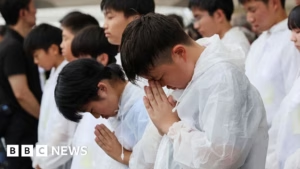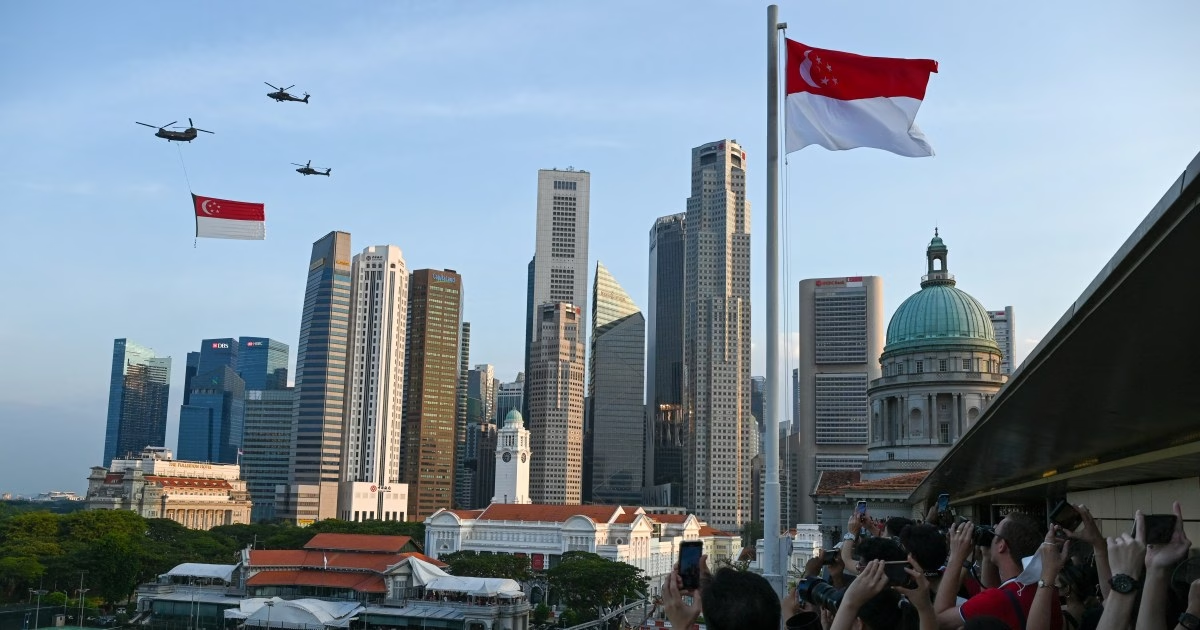The numerous skyscrapers and futuristic buildings stand as a testament to the nation’s outstanding development since its separation from Malaysia in 1965.
This tiny Southeast Asian state, boasting a population of just over six million, enjoys among the highest wealth per capita globally. Its thriving economy also draws in workers from all corners of the world.
Singapore’s financial hub is celebrated for its stability, high standard of living, progressive mindset, and a governance model renowned for its centralized approach.
While Singapore will revel in its success over the weekend, after the flags are lowered and SG60 merchandise is cleared from shelves, the island nation will resume its work and ponder its future.
Plans are already under way to foster further growth. The city’s most iconic landmark – Marina Bay Sands – is set to add a new, fourth tower of hotel rooms by 2029, with a 15,000-seat indoor arena also to be constructed at the site.
Changi International Airport, which has been the world’s best airport for the 13th time this year, will gain an additional terminal by the mid-2030s.
Residents of the “Lion City” clearly have much to anticipate, but the path forward might also include challenges.
Al Jazeera has been examining some of the issues Singapore may face in the next 60 years, and how they might be addressed.

Climate Change
As a low-lying island situated just north of the equator, Singapore is particularly susceptible to the threat of a changing climate. The nation’s former Prime Minister, Lee Hsien Loong, once termed it a matter of “life and death.”
Rising seas and increased rainfall could lead to flooding, with extreme weather events becoming a more regular occurrence.
Although the city-state has avoided the kind of weather-related chaos that affects many of its neighbors, the government is preparing for the worst.
Rising sea levels are of grave concern, with projections suggesting the waters around Singapore could increase by more than a meter by 2100.
To combat this, plans are being considered to build three artificial islands off the country’s east coast. These areas of reclaimed land would be raised higher than the mainland, acting as a protective barrier.
Benjamin Horton, former director of the Earth Observatory of Singapore, indicated that a catastrophic combination of heavy rain and high tide could potentially bring the country to a standstill.
“Singapore might be overwhelmed if much of its infrastructure were to flood, leading to the shutdown of MRTs, emergency routes, and possibly power stations – it could cripple the nation,” Horton remarked.
The already warm Southeast Asian financial hub will also face hotter temperatures.

A 2024 government study indicated that daily average temperatures could climb by up to 5 degrees Celsius by the end of this century.
Horton, now Dean of the School of Energy and Environment at City University of Hong Kong, believes this rise could notably impact economic productivity.
“Singapore is continually progressing, relying on immigrant labor that often works outdoors during the day. Climate change will significantly impact this,” he said.
However, Horton also believes Singapore has “the potential to lead the charge in adapting to climate change and to excel in coastal protection.”
Demographic Time Bomb
Singapore’s population is aging rapidly.
By 2030, approximately one in four citizens is estimated to be 65 years of age or older.
The life expectancy for a Singaporean today is slightly under 84 years, with inhabitants benefiting from a high quality of life and a leading healthcare system.
This demographic shift will likely challenge the city-state over the next 60 years.
An aging population will obviously require increased investment in the healthcare sector and may lead to workforce shortages of younger workers.

“The resulting strain will not only test the resilience of healthcare institutions but also place significant emotional, physical, and financial pressure on family caregivers,” stated Chuan De Foo, a research fellow at the National University of Singapore’s Saw Swee Hock School of Public Health.
While authorities are expanding and strengthening healthcare infrastructure, they also encourage citizens to make healthier lifestyle choices to maintain wellness for longer. New marketing campaigns promote regular health check-ups, supporting early intervention, and new technology is being utilized.
“AI-driven tools are in development to support mental wellbeing, detect early signs of clinical deterioration, and assist in diagnosis and disease management,” Foo informed Al Jazeera.
Fewer Babies
In addition to living longer, Singaporeans, like many in advanced Asian economies, are having fewer babies, adding to the country’s demographic issues.
The fertility rate, which measures the average number of children a woman is expected to have during her lifetime, dropped below 1.0 for the first time in 2023, showing little sign of an increase.
This figure is lower than Japan’s fertility rate of 1.15. This week, Japan reported its 16th consecutive year of population decline, with nearly a million more deaths than births in 2024.
Kalpana Vignehsa, a senior research fellow at NUS’s Institute of Policy Studies think tank, stated that the Singapore government is “going against a cultural tide” in its efforts to reverse the decline in births.
“The time has come for broad action to make parenting less costly, less stressful, and, most importantly, highly valued and communally supported,” Vignehsa said.

An Unstable World
Singapore is known for its impartial approach to foreign policy, balancing robust ties with both China and the United States.
However, as the global superpowers’ relations become increasingly tense, the Lion City’s neutrality might be challenged.
Any strategic shift towards Washington or Beijing is expected to be subtle, according to Alan Chong, a senior fellow at the S Rajaratnam School of International Studies.
Chong noted that this situation transpired during the COVID pandemic when Washington did not readily offer support to Asian countries.
“Almost all of Southeast Asia, including Singapore, leaned towards Beijing for economic support without publicizing it,” Chong said.
US President Donald Trump’s protectionist tariff policy has also caused concern in this Southeast Asian business hub, which relies heavily on global trade.
Despite the threat posed by Washington’s increasingly protectionist stance, Chong believes Singapore is prepared to weather the storm following the signing of a trade agreement in 2020.
The Regional Comprehensive Economic Partnership was negotiated among 15 mainly Southeast Asian countries plus significant North Asian economies, including China, Japan, and South Korea.
“It serves as a considerable insurance against any comprehensive global trade shutdown,” said Chong.
Stability at Home
While the international outlook appears increasingly tumultuous, Singapore’s domestic political landscape is poised for more stability in the near future.
The ruling People’s Action Party (PAP) has maintained control since the nation’s inception and shows no signs of relinquishing power.
In the recent election, the PAP, headed by new Prime Minister Lawrence Wong, secured all but 10 parliamentary seats with slightly over 65% of the vote.
While the nation’s leadership is likely to remain consistent in the short term, Teo Kay Key, a research fellow at the Institute of Policy Studies Social Lab, predicts that younger Singaporeans will soon seek a different political style – one that is more open and participatory.
“Younger generations are more likely to favor open discussions and exchange of ideas,” she said.
“There is also an emerging trend favoring open discussions, with a more democratic exchange of ideas,” she added.









